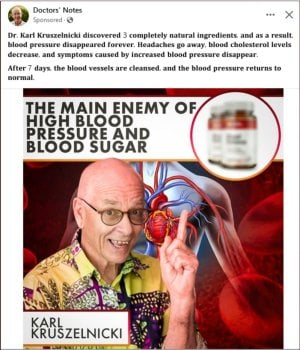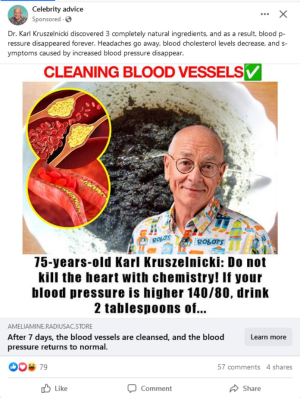Beware: Fake 'Dr Karl' health ad circulates online
By
Seia Ibanez
- Replies 8
The internet has become a trusted resource for news, education, and health advice.
However, this reliance on digital platforms also opens the door to new forms of deception, as scammers become increasingly sophisticated in their methods to dupe unsuspecting individuals.
The latest scam to hit is an insidious one, involving the misuse of artificial intelligence (AI) to exploit the trust and reputation of one of the nation's most beloved science communicators, Dr Karl Kruszelnicki.
Dr Karl, as he is affectionately known, has spent a lifetime demystifying science and debunking myths, earning the respect and trust of Australians. It is this very trust that scammers have weaponised against the public.
In a disturbing trend, hundreds of ads have surfaced on social media platforms featuring fake endorsements from Dr Karl for various health products.
‘There's hundreds of people advertising this stuff with my name and face on different sites around the world,’ Dr Karl said.
The scam came to light when individuals like Fred, a retired landscape gardener from Victoria, were enticed by what appeared to be Dr Karl promoting a blood pressure pill.
The AI-generated video was convincing enough to bypass Fred's initial scepticism, leading him to purchase the product.
‘I thought he's dinky-di, so there's no problem,’ Fred said.
‘It was the endorsement that convinced me to give it a go.’
Fake Nine News and Chemist Warehouse websites created AI-generated news articles claiming Dr Karl supported this new blood pressure pill.
This coordinated campaign created a 'hall of mirrors' of fake endorsement, where each piece of deception supports another, making it increasingly difficult for individuals to discern reality from fiction.
The situation is exacerbated by the response of big tech companies like Meta, the parent company of Facebook and Instagram.
Despite reports from users, Meta initially claimed the ads did not breach its advertising standards. Only after significant media attention did Meta remove the content, but even then, new versions of the scam ads quickly resurfaced.
According to Kathy Sundstrom, Manager of Outreach and Education of the National anti-scam charity IDCARE, there has been an uptick in scams using AI-generated content.
Public figures like billionaire Gina Rinehart and TV personality Andrew Forrest are also being impersonated to promote fraudulent schemes.
‘Celebrity endorsement scams are nothing new, but what is new is the use of deep fakes,’ she said.
The consequences can be devastating, with one individual reporting a financial loss of $110,000 due to a scam using Rinehart's likeness.
While the Australian Competition and Consumer Commission (ACCC) and the Therapeutic Goods Administration (TGA) are aware of these scams, the transient nature of the companies involved often means they disappear before any legal recourse can be taken.
‘The TGA is aware of the matter referred to and does not comment on individual matters,’ the TGA said.
The TGA added that the fake Dr Karl ads breached the Australian Consumer Law and violated regulations around therapeutic claims.
‘Advertisements for therapeutic goods that are not on the Register and containing statements such as regulating high blood pressure, reducing cholesterol, and controlling insulin resistance would likely be considered therapeutic claims and raise concerns under the [Therapeutic Goods Act],’ a spokesperson said.
 Have you or someone you know encountered similar scams? Let us know in the comments below.
Have you or someone you know encountered similar scams? Let us know in the comments below.
However, this reliance on digital platforms also opens the door to new forms of deception, as scammers become increasingly sophisticated in their methods to dupe unsuspecting individuals.
The latest scam to hit is an insidious one, involving the misuse of artificial intelligence (AI) to exploit the trust and reputation of one of the nation's most beloved science communicators, Dr Karl Kruszelnicki.
Dr Karl, as he is affectionately known, has spent a lifetime demystifying science and debunking myths, earning the respect and trust of Australians. It is this very trust that scammers have weaponised against the public.
In a disturbing trend, hundreds of ads have surfaced on social media platforms featuring fake endorsements from Dr Karl for various health products.
‘There's hundreds of people advertising this stuff with my name and face on different sites around the world,’ Dr Karl said.
The scam came to light when individuals like Fred, a retired landscape gardener from Victoria, were enticed by what appeared to be Dr Karl promoting a blood pressure pill.
The AI-generated video was convincing enough to bypass Fred's initial scepticism, leading him to purchase the product.
‘I thought he's dinky-di, so there's no problem,’ Fred said.
‘It was the endorsement that convinced me to give it a go.’
Fake Nine News and Chemist Warehouse websites created AI-generated news articles claiming Dr Karl supported this new blood pressure pill.
This coordinated campaign created a 'hall of mirrors' of fake endorsement, where each piece of deception supports another, making it increasingly difficult for individuals to discern reality from fiction.
The situation is exacerbated by the response of big tech companies like Meta, the parent company of Facebook and Instagram.
Despite reports from users, Meta initially claimed the ads did not breach its advertising standards. Only after significant media attention did Meta remove the content, but even then, new versions of the scam ads quickly resurfaced.
According to Kathy Sundstrom, Manager of Outreach and Education of the National anti-scam charity IDCARE, there has been an uptick in scams using AI-generated content.
Public figures like billionaire Gina Rinehart and TV personality Andrew Forrest are also being impersonated to promote fraudulent schemes.
‘Celebrity endorsement scams are nothing new, but what is new is the use of deep fakes,’ she said.
The consequences can be devastating, with one individual reporting a financial loss of $110,000 due to a scam using Rinehart's likeness.
While the Australian Competition and Consumer Commission (ACCC) and the Therapeutic Goods Administration (TGA) are aware of these scams, the transient nature of the companies involved often means they disappear before any legal recourse can be taken.
‘The TGA is aware of the matter referred to and does not comment on individual matters,’ the TGA said.
The TGA added that the fake Dr Karl ads breached the Australian Consumer Law and violated regulations around therapeutic claims.
‘Advertisements for therapeutic goods that are not on the Register and containing statements such as regulating high blood pressure, reducing cholesterol, and controlling insulin resistance would likely be considered therapeutic claims and raise concerns under the [Therapeutic Goods Act],’ a spokesperson said.
Key Takeaways
- Fake endorsements using AI-generated images and videos of Dr Karl Kruszelnicki are circulating on social media, misleading people into buying health products.
- Despite reports to Meta, the fraudulent ads continued to appear until media intervention prompted their removal, though similar scams quickly resurfaced.
- The Australian Competition and Consumer Commission (ACCC) and the Therapeutic Goods Administration (TGA) are aware of the issue, with the latter confirming the advertised products are not registered as therapeutic goods.
- Using celebrities in fake endorsements, such as Dr Karl and mining magnate Gina Rinehart, has led to significant financial losses for victims, with calls for Meta to take more responsibility for the content hosted on their platforms.









